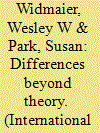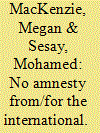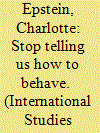|
|
|
Sort Order |
|
|
|
Items / Page
|
|
|
|
|
|
|
| Srl | Item |
| 1 |
ID:
114088


|
|
|
|
|
| Publication |
2012.
|
| Summary/Abstract |
The success of norms constructivists rests in part on their assertion of academic activism as a heroic aspect of intellectual life. Critics of this vision, however, insist on the complicity of norm scholars in creating and maintaining processes of global injustice. Frustrated with this criticism, Richard Price calls for answers to a simple question: can detractors go beyond mere criticism and provide a praiseworthy target toward which norms constructivists can aim? We respond to this challenge, first, by offering an internal critique of Price's logic. We suggest that Price and other norms entrepreneurs underplay the darker, colonial side of modern ethical life on which the successes of norms cascades depend. Second, we draw on Adam Hochschild's King Leopold's Ghost to contrast contemporary norms constructivists with the heroic characters represented in and by this book. Norms entrepreneurs, Edmund Morel and Roger Casement, successfully exposed Belgian atrocities in colonial Congo, and Hochschild himself brings this mostly forgotten history to light. Yet the narrative trajectory of these three heroes is tragic, compelling each to face their complicity in the very forces they resist. This tragic vision calls us not to celebrate but to resist the continuing legacies of colonial domination.
|
|
|
|
|
|
|
|
|
|
|
|
|
|
|
|
| 2 |
ID:
114085


|
|
|
|
|
| Publication |
2012.
|
| Summary/Abstract |
Over the past two decades, one of the main themes in IR theory debates has been a concern for the interplay of agents, structures, and change. In this article, we engage with these debates as they pertain to "the state of the art" by highlighting in broad fashion three "constructivist turns" and their implications for efforts to explain the rise and demise of norms. More specifically, we offer a stylized history of a debate marked by shifting emphases on structural constraints, strategic practices, and sentimental forces. In the context of this symposium, while we accept many of our colleagues' critiques of extant scholarship, we draw on the work of Richard Rorty to argue that the most important differences pertain to matters "beyond theory," regarding the effects of norms in enabling the establishment of either an open community or disciplinary society.
|
|
|
|
|
|
|
|
|
|
|
|
|
|
|
|
| 3 |
ID:
114087


|
|
|
|
|
| Publication |
2012.
|
| Summary/Abstract |
The literature on norms is dominated by debates over the definition of norms, discussion of the evolution of norms, norm diffusion, or norm implementation, and accounts of positive features associated with norms such as cooperation, mutual understanding. This paper argues that "the story" of international norms-or the dominant account of norms-is primarily a white, Western version that assumes that norms emerge from equal exchanges and relationship between states, denying the marked economic and political inequality between global actors and largely disregarding the intense contestations and controls associated with norms. In turn, this paper is an attempt to examine the tensions between so-called international norms and "local" norms and practices as well as the power dynamics and economic constraints that influence so-called global norms. Keeping in mind these tensions between the "story" of international norms and the practical constraints for local actors in the global south, this paper includes uses of the case study of Sierra Leone to examine what happens when "international" norms, such as those associated with transitional justice conflict with "local" norms. Specifically, the local norm of amnesty within Sierra Leone is studied in contrast to the international norm of truth and reconciliation commissions.
|
|
|
|
|
|
|
|
|
|
|
|
|
|
|
|
| 4 |
ID:
114090


|
|
|
|
|
| Publication |
2012.
|
| Summary/Abstract |
A recent paper in this journal proposed that post-impact public evaluations of governmental disaster performance may be usefully understood and analyzed along six "5C+A" dimensions: capability, competence, compassion, correctness, credibility, and anticipation. Using post-disaster public opinion data from El Salvador in 2001 and Peru in 2007, we offer the first empirical tests of this 5C+A approach, finding that it cannot be disconfirmed at this point and that public perceptions of the five "Cs" (capabilities, competence, compassion, correctness, and credibility) are clearly related to the public's overall estimations of governmental disaster response and evaluations of presidential disaster performance in some settings. Interestingly, the proposed "A" dimension (anticipation) drops out for both governments and leaders. The implications are serious for both researchers and practitioners interested in the rapidly evolving study of "the politics of disaster."
|
|
|
|
|
|
|
|
|
|
|
|
|
|
|
|
| 5 |
ID:
114086


|
|
|
|
|
| Publication |
2012.
|
| Summary/Abstract |
In this paper, I use a phenomenon of resistance to a global norm as a catalyst to critically re-examine the cognitive frames underpinning the use of the concept of socialization in international relations. My critique, which adds to the now growing critique of constructivism's neglect of the role of power in the international system, is threefold. First, socialization tends to be apprehended as a bettering of the socializee, because of an implicit teleological assumption of change as progress. Second, the concept tends to frame out the perspective of the socializee. Third and relatedly, it infantilizes the socializee. I use the international politics of whaling to illustrate the practical and conceptual effects of this infantilization of the socializee and specifically the ways it curtails both policymaking and scholarly research. The purpose of my efforts here are not to discount the usefulness of "socialization" in understanding norm dynamics but to caution against these three particular forms of silencing effected by the epistemological apparatus that has taken shape around it.
|
|
|
|
|
|
|
|
|
|
|
|
|
|
|
|
| 6 |
ID:
114089


|
|
|
|
|
| Publication |
2012.
|
| Summary/Abstract |
Most undergraduate courses on foreign policy discuss important models and explanations of foreign policy decision making, such as the rational actor, organizational process and governmental politics models, and groupthink. It is often difficult for students to fully understand how to apply and use these concepts to analyze foreign policy decision-making processes. One way to encourage such analytical thinking is to have students utilize various models to explain a specific event. While this is a useful task, students often gain a greater level of comprehension when they are evaluating a decision-making process in which they have personally taken part in. As such, role-playing simulation can be a very effective tool in helping students learn to understand and, more importantly, apply these various decision-making models and explanations. This paper presents an example of how simulations can help teach these concepts by presenting specific information regarding a simulation of US-Iranian relations.
|
|
|
|
|
|
|
|
|
|
|
|
|
|
|
|
|
|
|
|
|